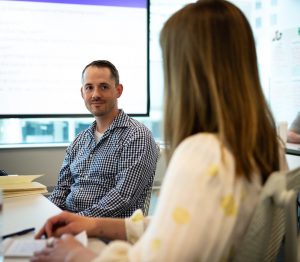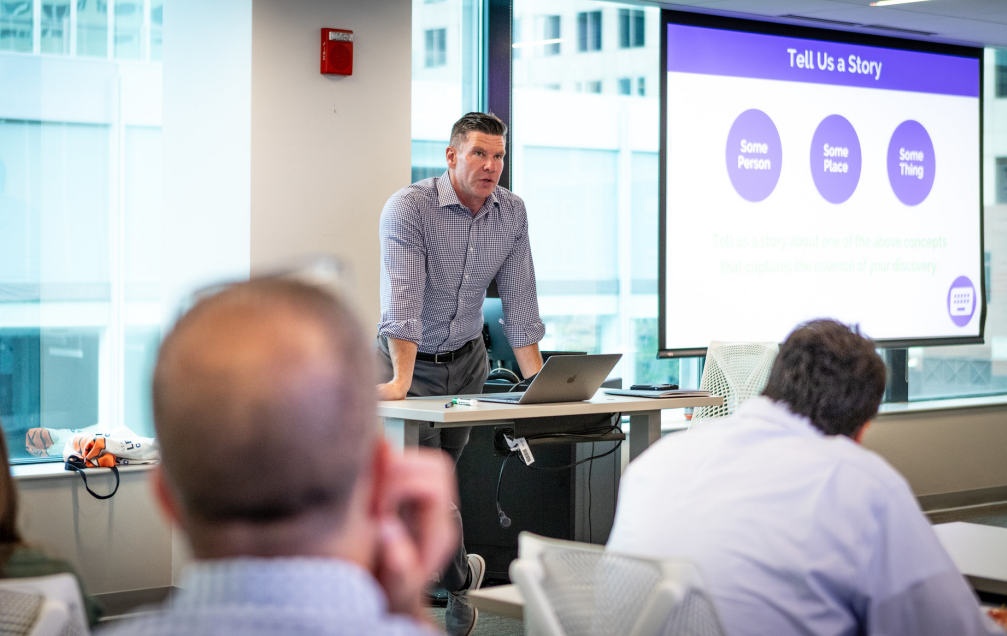In one exercise, the group stood in a circle, passing an imaginary ball back and forth. Some passed gently, others aggressively, sometimes with flourishes, other times with apologetic glances. The pace quickened as they got more comfortable, changing directions and pantomiming more assertively. In another exercise, a customer-focused story was created, with a word or phrase from each participant then being “passed” to the next person in the group who built on the narrative, sometimes changing direction or expanding creatively.
As they progressed, the group energy moved from awkward to more comfortable, and as people relaxed, they began laughing and clearly enjoying themselves. The facilitator watched, and when he stopped the exercise, offered feedback, including reflections on how people often need to come apart to come together, and the role of non-verbal cues and behaviors.
This particular group was a team of engineers and scientists; they had come together because their company leaders understood that learning to communicate more effectively is as critical a skill as the many other professional tools and resources they utilized daily.
To that end, UConn’s College of Engineering (CoE) recently introduced its Center for Advanced Engineering Education – Excellence in Engineering Communication (EEC) program. This non-credit customized training and development programming complements the college’s Master of Engineering (MENG) degree programs, engineering graduate certificates, specialized engineering boot camps and other customizable non-credit programs.
EEC is led by Program Director Rory McGloin, a business communication professor at UConn. He also serves as the associate director for Entrepreneurial Communication and Research with the Connecticut Center for Entrepreneurship and Innovation (CCEI). Additionally, McGloin mentors graduate students interested in organizational communication research, develops executive-level training programs, and supports entrepreneurs in their start-up journeys.

Successful projects, McGloin explains, require collaboration, empathy, the wisdom to effectively give and receive useful feedback and a variety of interpersonal abilities not typically taught-–or learned—in many degree programs.
“We customize this programming for engineering teams with the goals of strengthening daily performance and confidence, improving presentation skills and focusing on best practices,” says McGloin. “It’s team building, professional development, highly interactive and personally challenging, all aimed at helping engineering professionals become more intuitive listeners, influencers, business partners and leaders.”
McGloin stresses the importance of building a workplace that values communication, explaining that good communicators require presence, sincerity, respect, engagement and clarity. People, especially leaders, need to learn to read and understand body language, as well as express clear expectations and not be afraid to engage in two-way debate and dialog, however challenging the topic. Learning to listen, he stresses, is critical, so the group focuses on barriers to effective listening, and methodologies for discovering and interpreting distinct characteristics that help work associates improve their relationships with management, clients, vendors and one another.
McGloin recently facilitated a four-part class for the senior leadership team of Loureiro Engineering Associates, Inc. Loureiro provides integrated multi-disciplinary engineering, consulting and construction services, with a focus on government and manufacturing sectors. They are headquartered in Connecticut with offices throughout New England, the Southeast and the Midwest.
The team worked on new mission and purpose statements, and focused on multiple team-building challenges. They completed a number of interactive exercises designed to promote cohesiveness, examine personal space, interpret non-verbal communication, improve brainstorming, address commonalities and differences, strengthen public speaking skills and explore personal and collective strengths and weaknesses.
Kate Engler is vice president of Environmental Assessment at Loureiro, and was a participant in the Loureiro training program. She says she especially enjoyed the interactive and provocative nature of the sessions.
“Rory has a unique ability to disarm the group into providing input on a topic, and asks good, probing follow-up questions to spur further conversation,” Engler explains. “I was surprised how quickly he was able to develop a sense of trust and openness with all of us despite our varied personalities, and how quickly I noticed my teammates being open to deep, meaningful and productive conversations.
“Sometimes in our day-to-day challenges,” she adds, “we forget that we each have individual motivations, personalities and experiences, and we need this awareness to come to the forefront so that we can better understand one another’s differences and work together effectively. I am more aware of those differences now when working with my teammates on the leadership team, as well as those in my division, and we can harness our individual strengths better as a result.”
Brian Cutler, CEO at Loureiro, requested and joined in the EEC training program. He says that it wasn’t a cookie-cutter experience, but rather a mix of off-the-shelf concepts put together in a way that fits Loureiro. He found the experience deeply reflective of pre-training conversations he had with McGloin to identify goals, discuss challenges, and provide background on Loureiro, himself and his team. McGloin, Cutler recalls, took the lead after the meeting and drafted an initial set of concepts describing what “help” could look like.
“Our first interactions with Rory were one-on-one meetings with a subset of our leadership team, those with Profit & Loss responsibilities,” Cutler says. “Following those initial discussions, we each had a similar reaction: we felt comfortable talking to him and opened up about ourselves and the organization. In short, he gave us a space where we could develop trust. I had nothing to do with that, meaning I did not prime the members of the team. That impressed the heck out of me and gave me a level of confidence we were heading in a good direction.”
The feedback from his team, Cutler explains, is that they enjoyed the classes and, even early on, felt they were making progress and doing important work. For some of them, he adds, the results have been transformational, and he felt that that the engagement with Rory has been positive for their individual and collective development.
“If you are a person that leads a team, understands that you are flawed, and cares about the wellbeing of your people, Rory is someone you should talk to,” Cutler reflects. “He is a listener and passionate builder of teams. I am already thinking about how we can stay engaged with him into the future.”
Building and enhancing relationships such as the one with Loureiro, stresses CAEE Director Nora Sutton, is a valuable asset for UConn and for regional industry.
“Our non-credit professional education programs, like Dr. McGloin’s Excellence in Engineering Communication, strengthen UConn Engineering’s connections to local industry,” Sutton says. “In addition to years of success offering graduate-level degrees, we’re now poised to meet companies and individual engineers where they are: ready to grow and upskill as lifelong learners.”
For more information about UConn’s Center for Advanced Engineering Education – Excellence in Engineering Communication program (EEC), contact them at engrcaee@uconn.edu



